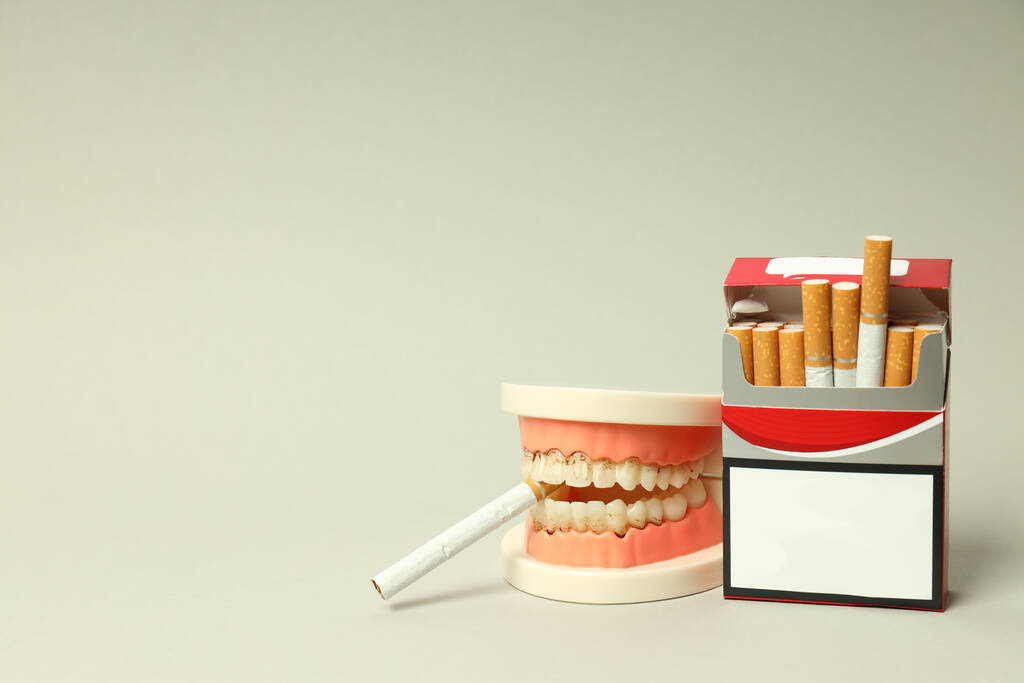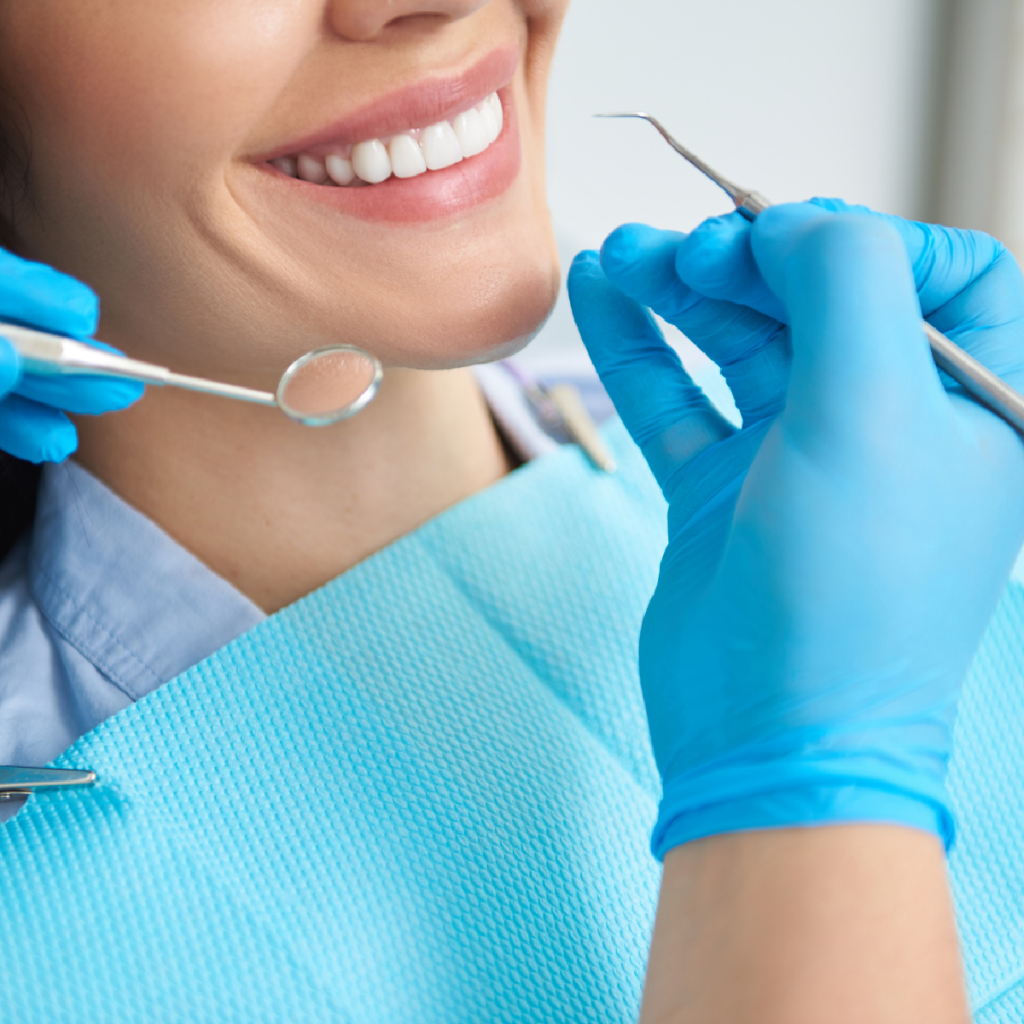Discover the impact of smoking and tobacco use on dental health.
Can Smoking or Tobacco Use Affect Dental Health?
Smoking and tobacco use have long been known to have negative effects on overall health. But did you know that they can also wreak havoc on your dental health? In this article, we’ll dive into the relationship between smoking, tobacco use, and dental health, exploring the basics of dental hygiene, the impact on oral diseases, and ways to improve your dental health by quitting smoking. So, let’s light up our knowledge and get started!

Understanding the Basics of Dental Health
Before we delve into the connection between smoking and dental health, let’s first brush up on the basics. Maintaining good oral hygiene is essential for keeping your pearly whites happy and healthy. Regular brushing, flossing, and dental check-ups help to prevent common dental health issues.
The Importance of Oral Hygiene
Your mouth is like a bustling city, teeming with bacteria. Brushing twice a day with fluoride toothpaste helps to remove plaque, a sticky film that forms on your teeth. Flossing gets into the nooks and crannies, removing plaque and leftover food particles. Good oral hygiene not only prevents tooth decay and gum disease but also keeps your breath fresh, ensuring you’re always ready to dazzle with your smile!
But did you know that there’s more to oral hygiene than just brushing and flossing? It’s true! Your diet plays a significant role in maintaining dental health. Consuming a balanced diet rich in fruits, vegetables, and whole grains provides essential nutrients that promote strong teeth and gums. On the other hand, excessive consumption of sugary and acidic foods and beverages can lead to tooth decay and erosion.
Another crucial aspect of oral hygiene is the use of mouthwash. Mouthwash helps to kill bacteria, freshen breath, and reach areas that brushing and flossing may miss. It’s like an extra layer of protection for your teeth and gums!
Common Dental Health Issues
We’ve all heard horror stories about toothaches, cavities, and gum infections. Poor oral hygiene can lead to a plethora of dental health issues, including tooth decay, gum disease, and bad breath. But did you know that smoking can make these problems even worse? It’s time to explore the dark side of smoking and its impact on dental health.
Smoking is not only harmful to your overall health but also wreaks havoc on your oral health. The chemicals in cigarettes, such as nicotine and tar, stain your teeth, giving them a yellowish appearance. Over time, these stains can become stubborn and difficult to remove, affecting your smile’s aesthetics.
But the damage caused by smoking goes beyond cosmetic concerns. Smoking weakens your immune system, making it harder for your body to fight off infections, including those in your mouth. This weakened immune response increases the risk of gum disease, which can lead to tooth loss if left untreated.
Furthermore, smoking impairs blood flow to the gums, reducing their ability to heal. This means that if you have gum disease or undergo dental procedures like extractions or implants, smoking can significantly delay the healing process, prolonging your discomfort and increasing the risk of complications.
It’s not just the gums that suffer from smoking; your tongue and throat are also affected. Smoking can cause a condition called “smoker’s tongue,” which is characterized by a white or yellowish coating on the tongue’s surface. Additionally, smoking increases the risk of oral cancer, affecting the lips, tongue, cheeks, and throat.
So, if you’re a smoker, it’s crucial to prioritize your oral health and take steps to quit smoking. Not only will it improve your overall health, but it will also significantly reduce your risk of developing dental health issues and enhance the longevity of your smile.
The Relationship Between Smoking and Dental Health
When it comes to smoking, the harm goes far beyond what meets the eye. Let’s uncover how smoking affects oral hygiene and the detrimental effects it has on your teeth and gums.
Did you know that smoking puts your oral hygiene at risk by reducing blood flow to the gums? This reduction in blood flow makes it harder for your body to fight off infections, increasing the risk of gum disease. Gum disease can manifest as red, swollen, and bleeding gums, which can be quite uncomfortable and unsightly. Yikes!
But that’s not all. Smoking also stains your teeth, giving them a yellowish tint that no amount of whitening toothpaste can fix. So, if you’re dreaming of a shining Hollywood smile, it’s time to say goodbye to smoking.
How Smoking Impacts Oral Hygiene
Let’s delve deeper into how smoking affects oral hygiene. As mentioned earlier, smoking reduces blood flow to the gums, which is essential for maintaining healthy gum tissue. This compromised blood flow weakens the gums’ ability to fight off infections, making smokers more susceptible to gum disease.
Gum disease, also known as periodontal disease, is a serious condition that can lead to tooth loss if left untreated. The toxins in cigarette smoke irritate the gums, causing inflammation and infection. Over time, this can result in the destruction of the bone and tissues that support the teeth, leading to tooth loss.
Additionally, smoking can also hinder the healing process after dental procedures. Whether you’ve had a tooth extraction or dental implant, smoking slows down the healing process and increases the risk of complications. This is because smoking impairs blood flow and reduces oxygen levels in the body, making it harder for your mouth to recover.
The Effect of Tobacco on Teeth and Gums
It’s no secret that smoking is a real sucker for your teeth and gums. Apart from stains, tobacco poses several other risks to your oral health.
Firstly, smoking increases the risk of tooth decay. Saliva plays a crucial role in protecting your teeth by neutralizing acids and washing away food particles. However, smoking compromises the saliva’s ability to do its job effectively, leaving your teeth vulnerable to decay.
Furthermore, smoking can cause bad breath, also known as halitosis. The chemicals in tobacco smoke can linger in your mouth and lungs, leading to an unpleasant odor that can be difficult to get rid of. This can be a major turn-off in social and professional situations.
Lastly, smoking can also affect the success of certain dental treatments. For example, if you’re considering getting dental implants, smoking can increase the risk of implant failure. The chemicals in tobacco smoke can interfere with the integration of the implant with the surrounding bone, compromising its stability and longevity.
So, it’s clear that smoking takes a toll on your dental health in more ways than one. If you’re a smoker, quitting is the best thing you can do for your oral health. Not only will you improve the appearance of your teeth and gums, but you’ll also reduce your risk of developing serious oral health problems in the future.
The Impact of Smoking on Oral Diseases
Smoking not only affects your oral hygiene but also puts you at a higher risk of developing serious oral diseases. Let’s explore the two most significant culprits – gum disease and oral cancer.
Smoking and Gum Disease
Gum disease, also known as periodontal disease, is a bacterial infection that affects the gums and bones supporting your teeth. When you smoke, the harmful chemicals in cigarettes not only damage your lungs but also weaken your immune system. This weakened immune system makes it harder for your body to fight off the bacteria that cause gum disease.
As a result, smokers are more prone to gum recession, bone loss, and eventually tooth loss. The nicotine in cigarettes constricts blood vessels, reducing blood flow to the gums, which impairs their ability to heal and fight off infections. Additionally, smoking also causes a decrease in saliva production, which is essential for washing away food particles and neutralizing harmful acids in the mouth.
Furthermore, smoking can mask the symptoms of gum disease, making it difficult to detect and treat in its early stages. This delay in diagnosis and treatment can lead to more severe gum disease and irreversible damage to the gums and supporting structures.
It’s time to stub out that cigarette and save your smile! Quitting smoking not only improves your oral health but also has numerous other benefits for your overall well-being.
The Link Between Oral Cancer and Tobacco Use
Oral cancer is a serious disease that affects the mouth, lips, tongue, and throat. Smoking and tobacco use are the leading causes of oral cancer, contributing to a staggering number of cases each year.
The toxic chemicals in cigarettes can damage DNA and other genetic material, leading to the development of cancerous cells. When you inhale cigarette smoke, these harmful substances come into direct contact with the delicate tissues in your mouth and throat, increasing the risk of cellular mutations and the formation of cancerous growths.
Not only does smoking increase the risk of developing oral cancer, but it also affects the prognosis and treatment outcomes. Smokers with oral cancer tend to have a higher rate of recurrence, poorer response to treatment, and lower survival rates compared to non-smokers.
It’s time to end your toxic affair with tobacco and prioritize your oral health! Quitting smoking is the best way to reduce your risk of developing oral cancer and improve your chances of successful treatment if you are already diagnosed.
Remember, your oral health is closely linked to your overall health. By quitting smoking and adopting a comprehensive oral hygiene routine, you can protect your teeth, gums, and overall well-being.
Quitting Smoking and Improving Dental Health
By now, it’s clear that smoking and tobacco use are detrimental to your dental health. But fear not! There is light at the end of the tunnel. Let’s explore steps to quit smoking and embrace a healthier oral hygiene routine.
Steps to Quit Smoking for Better Oral Health
Quitting smoking may seem like an uphill battle, but every journey starts with a single step. Consider enlisting the support of loved ones, joining a support group, or seeking professional help. Whether it’s nicotine replacement therapy or behavioral therapy, there are many effective methods to kick the habit. Your teeth and gums will thank you!
Dental Health Recovery After Quitting Tobacco
Once you stub out that last cigarette, your dental health will begin to bounce back. Visit your dentist for a thorough cleaning and examination to track your progress. You may need additional treatments like professional teeth whitening or gum disease therapy, depending on the extent of the damage. Embrace your smoke-free future and let your dental health sparkle once again!
Prevention and Treatment Options
Prevention is always better than cure, and the same holds true for dental health. Let’s explore dental treatments for smokers and preventive measures to maintain your newfound dental health.

Dental Treatments for Smokers
If smoking has taken a toll on your dental health, fret not! Your dentist can help restore your smile. From dental crowns and veneers to dental implants, there are various treatment options to address tooth decay, stains, and missing teeth. So, don’t be shy – consult with your dentist and reclaim your dental health!
Preventive Measures for Maintaining Dental Health
After putting in the hard work to quit smoking and restore your oral health, it’s essential to maintain it. Besides brushing and flossing, consider using antimicrobial mouthwashes and visiting your dentist regularly for check-ups and cleanings. Remember, prevention is your best weapon against dental problems – unleash your inner warrior and fight for your winning smile!
In conclusion, smoking and tobacco use definitely take a toll on dental health. They compromise oral hygiene, worsen dental issues, and increase the risk of oral diseases. However, by quitting smoking and adopting good oral hygiene habits, you can pave the way to a beautiful and healthy smile. So, make that commitment to your dental health today and say goodbye to smoking – your teeth will thank you!






